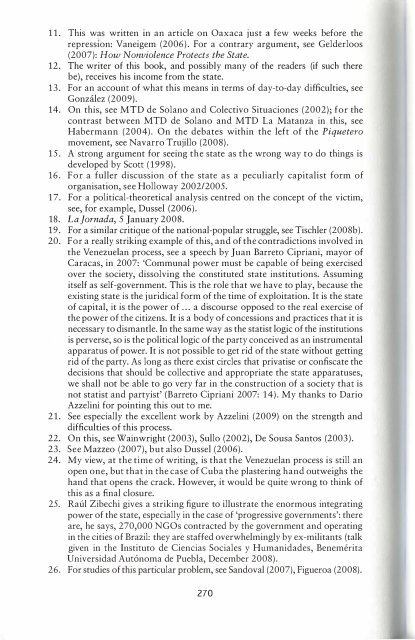CRACK CAPITALISM
Holloway - Crack Capitalism
Holloway - Crack Capitalism
- No tags were found...
You also want an ePaper? Increase the reach of your titles
YUMPU automatically turns print PDFs into web optimized ePapers that Google loves.
11. This was written in an article on Oaxaca just a few weeks before the<br />
repression: Vaneigem (2006). For a contrary argument, see Gelderloos<br />
(2007): How Nonviolence Protects the State.<br />
12. The writer of this book, and possibly many of the readers (if such there<br />
be), receives his income from the state.<br />
13. For an account of what this means in terms of day-to-day difficulties, see<br />
Gonzalez (2009).<br />
14. On this, see MTD de Solano and Colectivo Situaciones (2002); for the<br />
contrast between MTD de Solano and MTD La Matanza in this, see<br />
Habermann (2004). On the debates within the left of the Piquetero<br />
movement, see Navarro Trujillo (2008).<br />
15. A strong argument for seeing the state as the wrong way to do things is<br />
developed by Scott (1998).<br />
16. For a fuller discussion of the state as a peculiarly capitalist form of<br />
organisation, see Holloway 2002/2005.<br />
17. For a political-theoretical analysis centred on the concept of the victim,<br />
see, for example, Dussel (2006).<br />
18. La Jornada, 5 January 2008.<br />
19. For a similar critique of the national-popular struggle, see Tischler (2008b).<br />
20. For a really striking example of this, and of the contradictions involved in<br />
the Venezuelan process, see a speech by Juan Barreto Cipriani, mayor of<br />
Caracas, in 2007: 'Communal power must be capable of being exercised<br />
over the society, dissolving the constituted state institutions. Assuming<br />
itself as self-government. This is the role that we have to play, because the<br />
existing state is the juridical form of the time of exploitation. It is the state<br />
of capital, it is the power of ... a discourse opposed to the real exercise of<br />
the power of the citizens. It is a body of concessions and practices that it is<br />
necessary to dismantle. In the same way as the statist logic of the institutions<br />
is perverse, so is the political logic of the party conceived as an instrumental<br />
apparatus of power. It is not possible to get rid of the state without getting<br />
rid of the party. As long as there exist circles that privatise or confiscate the<br />
decisions that should be collective and appropriate the state apparatuses,<br />
we shall not be able to go very far in the construction of a society that is<br />
not statist and partyist' (Barreto Cipriani 2007: 14). My thanks to Daria<br />
Azzelini for pointing this out to me.<br />
21. See especially the excellent work by Azzelini (2009) on the strength and<br />
difficulties of this process.<br />
22. On this, see Wainwright (2003), Sullo (2002), De Sousa Santos (2003).<br />
23. See Mazzeo (2007), but also Dussel (2006).<br />
24. My view, at the time of writing, is that the Venezuelan process is still an<br />
open one, but that in the case of Cuba the plastering hand outweighs the<br />
hand that opens the crack. However, it would be quite wrong to think of<br />
this as a final closure.<br />
25. Raul Zibechi gives a striking figure to illustrate the enormous integrating<br />
power of the state, especially in the case of 'progressive governments': there<br />
are, he says, 270,000 NGOs contracted by the government and operating<br />
in the cities of Brazil: they are staffed overwhelmingly by ex-militants (talk<br />
given in the Instituto de Ciencias Sociales y Humanidades, Benemerita<br />
Universidad Aut6noma de Puebla, December 2008).<br />
26. For studies of this particular problem, see Sandoval (2007), Figueroa (2008).<br />
270


